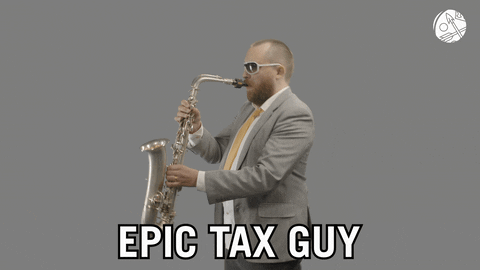A Guide to Property and Trading Income Allowance
The government is now making some online platforms declare the income people are making to prevent people from evading taxes. This means it's important now more than ever to know whether you qualify for tax-free allowances, the circumstances under which you'd have to declare your income, how to declare it and what records to keep. We know thinking about this can be slightly taxing (pun intended) but don't worry – we've got you covered.
Become a Host
Join thousands of Stashbee Hosts, start earning now
Become a Host
What is Property Income Allowance?
The Property Income Allowance is a tax break provided by HMRC. It allows individuals to earn up to £1,000 tax-free from property or trading income. This includes those of you who've got a knack for turning unused spaces into revenue streams.
Whether it's a vacant parking lot, a storage unit, or a garage with extra square footage - the first £1,000 of income is tax-free which we'd say is a well-deserved break from the taxman.

Source: www.vero.fi
What is trading income allowance?
Many of you also use these storage spaces to run a side-hustle. You can enjoy the same tax-free £1,000 on the income you earn from your side-hustle i.e trading income.
Selling clothes on Etsy, running an online vintage shop, or even a pop-up store - as long as your trading income is below the £1,000 mark, it's yours to keep. If your gross income for a tax year is more than £1,000, you must register for self-assessment.
What if my partner and I own the space?
Now, let's address joint ownership. If you're working with a partner or a friend on your parking space venture, the good news is that both of you can claim the allowance separately.
That means, if your combined income is £1,500, each co-owner can claim £1,000 individually.
Related
Lucrative Passive Income Ideas Other Than Renting Your Property to Tenants
Declaring or Opting Out of Property and Trading Income Allowance:
Declaring Property and Trading Income:
Keep meticulous records: Track every sale, expense, and transaction related to your business.
Calculate your income: If your income is below £1,000 - it's tax-free. If it surpasses this threshold, move on to the next step.
Complete the Self-Assessment Tax Return: Include your property or trading income in the relevant sections. HMRC's online platform makes this process easy. Enjoy your tax-free £1,000 and keep hustling!
Opting Out of the Allowance for Property and Trading Income:
Evaluate your future income and expense: If your business expenses surpass the allowance you may receive, consider opting out.
For example, if you make £12,000 a year from your online vintage store, you can use your allowance to reduce your taxable income to £11,000. However, if you’ve incurred expenses relating to your business amounting to £3000, it would prove more useful to use business expenses rather than income allowance to reduce your taxable income (£12000 - £3000 in this example)
Inform HMRC: Submit a declaration to HMRC indicating your decision to opt out of the allowance.
Keep accurate records: Maintain detailed records for smooth sailing during tax season, even without the allowance.
Earn Up to £1,000 Tax-Free with Stashbee
There are so many great passive income ideas out there, but earning tax-free money through the property tax allowance is one of the easiest ways to do so.
If you’re planning on earning income from your property, renting out storage or parking space could be the way to go.
Stashbee simplifies the process by giving you an estimate of what you can expect to earn every month from a storage or parking rental, no matter where you live. All you need to do is enter the storage type, estimated size and your postcode into our online calculator. In a matter of seconds, you’ll have the average price of all the listings (not just the market average) right in front of you.
From there, creating your actual listing takes just a couple of minutes. Once approved by the Stashbee team, you manage requests directly from the comfort of your own home. There are no hidden fees for potential renters to worry about, and insurance is covered for all storage clients. Talk about encouraging a hassle-free experience for both parties!

Source: https://mylittlemiki.tumblr.com/post/37947047633/aww-yeah-winter-break
Frequently Asked Questions about tax-free allowances:
Q1: Can I claim the allowance for both parking space rental and my clothing store?
Answer: Absolutely! You can apply the flexible Property and Trading Income Allowance to both, as long as they don't exceed £1,000 each.
Q2: Do I need separate records for my parking space rental and clothing store?
Answer: While it's not mandatory, keeping separate records for each venture can make your life easier when it's time to declare your income.
Q3: How does joint ownership work for trading income?
Answer: Similar to property income, each co-owner can claim the £1,000 allowance individually, providing a tax break for both partners.
Q4: Am I entitled to the allowance if I’m renting out a room?
Answer: If you rent out a room in your home, you may not have the right to claim this allowance. However, you may qualify for the £7,500 rent a room scheme.
Q5: Are there any exemptions to the allowance I should be aware of?
Answer: Certain individuals are exempt from using the property income allowance depending on the situation, check if you’re one of them:
a) Do you earn money from a business that’s owned by you or someone close to you?
b) Are you a part of a business partnership where you or someone close to you is a partner?
c) Do you receive property income from your employer or your civil partner/spouse’s employer?
If your answer to any of these questions is yes, you may not be eligible for the property income allowance.
💡 Disclaimer: While this guide provides valuable insights, individual circumstances may vary. Always consult with a qualified accountant or tax professional to ensure compliance with the latest HMRC regulations.
Become a Host
Join thousands of Stashbee Hosts, start earning now
Become a HostMeher
Written 19th Feb 2024
